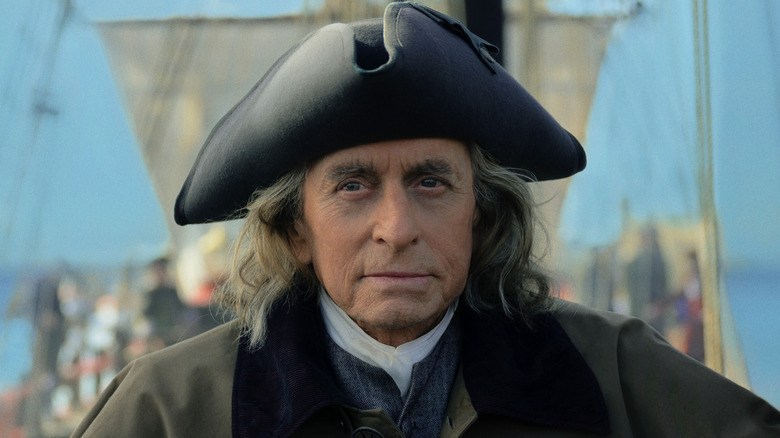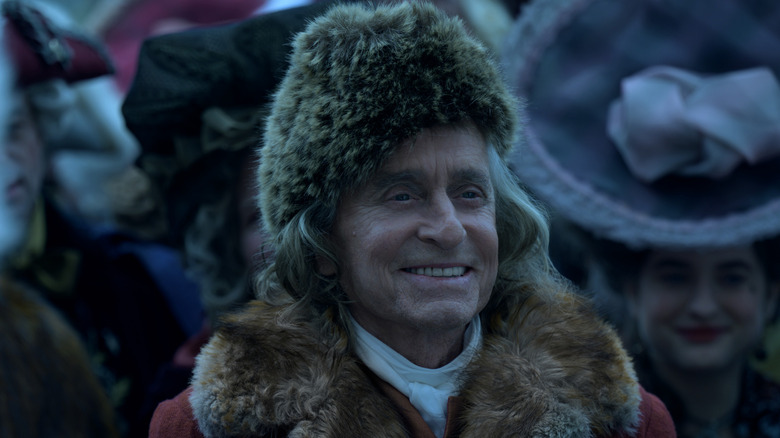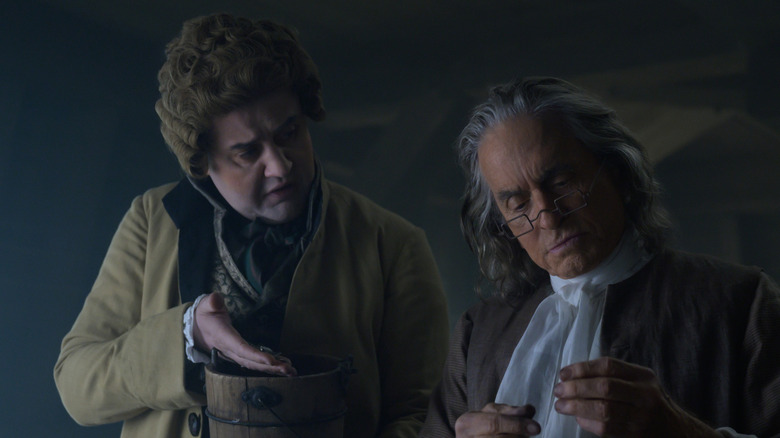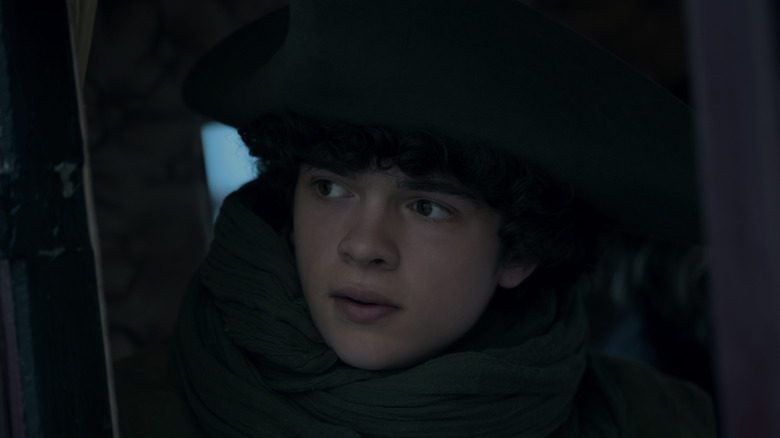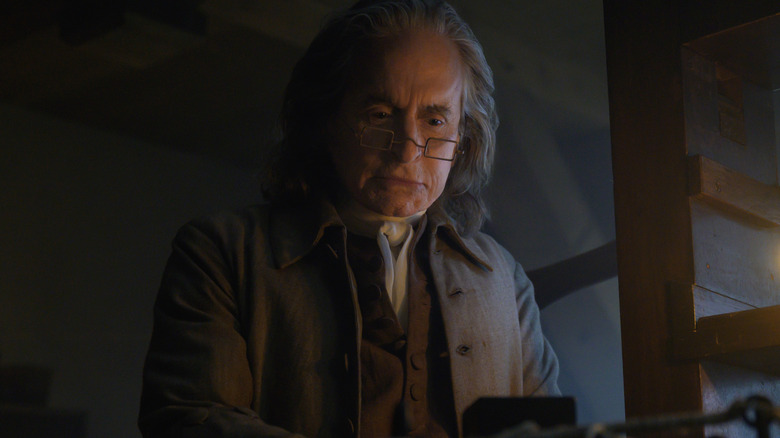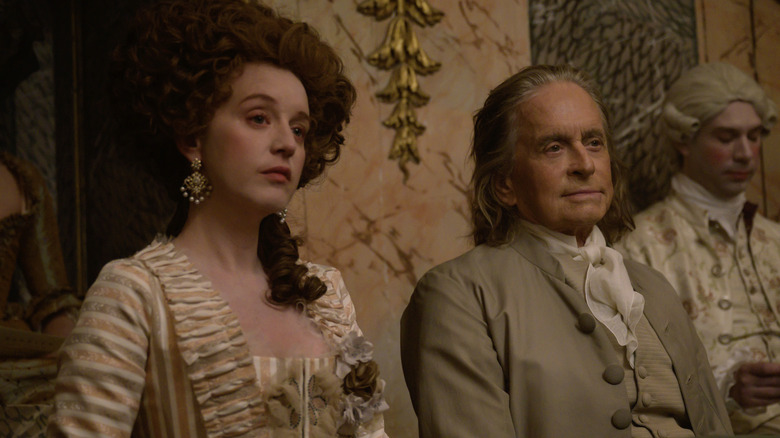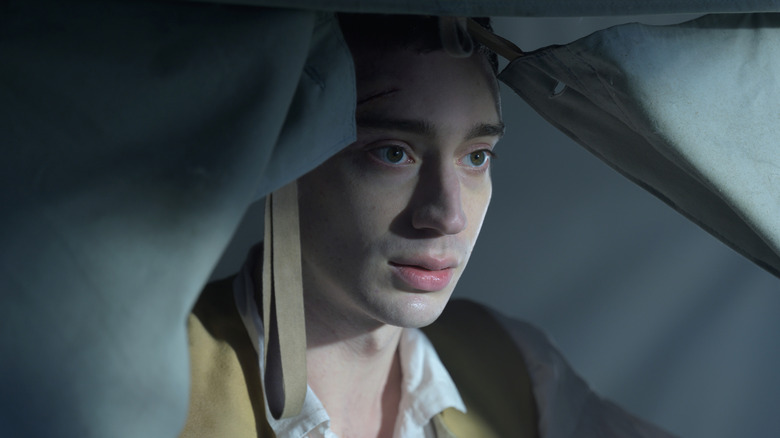Lies The Franklin Series On Apple TV+ Told You
In 2024, Apple TV+ launched "Franklin," a mostly accurate project about Benjamin Franklin, one of the famous and important figures in early American history but also one shrouded in legend, myth, and exaggeration. A major undertaking for Hollywood legend Michael Douglas, one of the only people to have won an Oscar for both acting and Best Picture, "Franklin" is a limited series that focuses on a specific and crucial period in the life of the statesman and American Founding Father: the near-decade that he spent in France securing an alliance between the European superpower and his upstart home nation.
In telling the story of how the would-be United States secured the financial and political backing to help it win its independence from the British, the "Franklin" cast and crew adhered as closely as possible to the deeply researched historical record. They also took a few creative liberties, because "Franklin" isn't a college textbook — it's a lavishly produced spectacle about the troubled history of Benjamin Franklin, and it's meant to entertain as much as inform. To that end, the show's writers, directors, and producers fudged a few details; sometimes TV shows and movies get history completely wrong. Where does "Franklin" succeed and fail? Here are all the times that the series isn't quite historically accurate, or when it just flat-out doesn't tell the true, full story.
False: Michael Douglas looks just like the real Benjamin Franklin
With his image appearing in hundreds of history books and on the $100 bill, Benjamin Franklin possesses one of the most familiar faces in American history. In the Apple TV+ limited series "Franklin," the also-familiar veteran actor Michael Douglas portrays the historical figure. But apart from a few props and minor accessories, Douglas doesn't closely resemble or physically embody Franklin. The actor is actually older than Franklin was at the time of his life explored in "Franklin" — Douglas was 77 when filming began in June 2022, while Franklin had just turned 70 when he arrived in France in December 1776. And yet, Douglas looks younger than Franklin does in numerous Revolutionary War-era portraits. Franklin's hairline was receding and almost gone, and he was significantly heavier than Douglas. This was a choice of the actor; Douglas didn't want to spend a lot of time each day in a makeup chair waiting for the application of prosthetics that would make him look at least a little bit like Franklin.
Not only does Douglas not look a lot like Franklin, he doesn't sound like him either. Franklin reportedly spoke with a pronounced Pennsylvania accent. Douglas, raised in California, just uses his regular speaking voice in "Franklin."
False: Benjamin Franklin thwarted a wily spy
Benjamin Franklin spent many years in Paris in the late 1700s trying to win over the French, already historically at odds with the British, giving France and the Americans a common enemy. With all these factions attempting to gain the upper hand, there was a lot of espionage going on in France at the time, as "Franklin" accurately suggests. One such spy with a significant presence in the series is Edward Bancroft (Daniel Mays), a Massachusetts-born double agent who works as a spy for both the British and the Americans.
In the show, he's a friend of Franklin. But Franklin's devotion to his young country is stronger than his loyalty to his pal, and so he drops as much wrong information as he can in Bancroft's presence to throw him off the track of what his compatriots back home are really up to. All of this works to characterize Franklin as clever and wily, even though history didn't play out like this. It's unlikely that Franklin, at least at the time, knew that Bancroft was secretly spying on behalf of the British, so his willful passing along of incorrect info is very much a fiction.
False: Temple Franklin was his grandfather's only relative in France
Apple TV+'s series "Franklin" often plays like a buddy movie, what with the central relationship of the historical drama being that of Benjamin Franklin (Michael Douglas) and his grandson, Temple Franklin (Noah Jupe). The dynamic between the two is a paternal, mutually respectful, fun-loving one that provides the perspective of both a young and old character trying to figure out what's going on around them in cosmopolitan 18th-century France. That two-man-team notion was largely cooked up for "Franklin," because the contingent of Americans on a persuasive visit to France consisted of far more individuals than just Franklin and his familial protege.
Benjamin Franklin Bache, the Founding Father's other, younger grandson, born to his sole daughter, Sally, also accompanied Franklin on his mission to France. Bache is never depicted in "Franklin." Nor was the elder Franklin the only official representative of the young United States government. He was accompanied and assisted in his goal to win over the French government to the American cause by diplomats Arthur Lee and Silas Deane.
False: Benjamin Franklin delivered a powerful proverb
"Franklin" is a narrative television series based on real events, as presented and contextualized in Stacy Schiff's 2006 nonfiction book "A Great Improvisation: Franklin, France, and the Birth of America." Some of the show's dialogue is as accurate as possible, even the part where the title character discusses flatulence — Benjamin Franklin's 1781 essay about farting is a real historical document.
Be that as it may, one powerful line from the show, which is really the thesis statement or major theme of the entire "Franklin" limited series, was likely never said by the American representative during his decampment to France. "Diplomacy must never be a siege but a seduction," Franklin proclaims, explaining how he's playing a slow, long game to convince the French government to support the American revolutionaries. There's no record of Franklin ever uttering that intriguing quip in real life. If anything, it's an adaptation of a line of dialogue from another historical miniseries about a contemporary of Franklin's. In HBO's "John Adams" from 2008, that program's Benjamin Franklin (Tom Wilkinson) remarks, "Diplomacy is seduction in another guise." That bit of dialogue was created for TV.
False: Anne-Louise Brillon was romantically interested in Franklin
Upon his arrival in Paris in the late 18th century, Benjamin Franklin didn't know very much French and even less about how Parisian high society worked. In order to secure an alliance with France, he must win over the country's most powerful people, and he needs help gaining their attention and respect. In "Franklin," he does so with the assistance of Anne-Louise Brillon de Jouy (Ludivine Sagnier), a well-connected composer and aristocrat.
"Franklin" presents the relationship and arrangement between Brillon and Franklin as mutually beneficial. She gets to hang out with a novel American celebrity to whom she demonstrates an undeniable physical attraction; Franklin, meanwhile, gets what he needs in a professional capacity by subtly exploiting Brillon's crush and flirting a little as they attend events together. In reality, Brillon did benefit from the relationship — her name became better known in elite circles for her connection to the famous Franklin — but she demonstrated merely a platonic, daughterly affection for the older diplomat.
False: Benjamin Franklin secured an officer commission for the Marquis de Lafayette
Following the events of "Franklin," after the United States successfully secured its independence from British rule, a French nobleman known as the Marquis de Lafayette was hailed as a hero of the revolution in the new country. Despite a lack of military service, and being a teenager and not American, he volunteered to sail to the British colonies and fight alongside the revolutionaries after earning a commission as a major-general in the Continental Army. Later, the Marquis de Lafayette helped create a new dog breed, but during the Revolutionary War, his leadership proved vital to victory.
Seemingly to demonstrate Benjamin Franklin's persuasive and impactful politicking in France, "Franklin" claims that the Marquis de Lafayette got the go-ahead to fight in America from the series' title character. "Franklin" says Franklin arranged for the Marquis de Lafayette's appointment to an officer rank. Historically, it was Silas Deane, one of Franklin's fellow diplomats with whom he traveled to France, who granted the major-general status, but he's not a character in "Franklin."
To learn more surprising facts about the American icon, read the untold truth of Benjamin Franklin.
